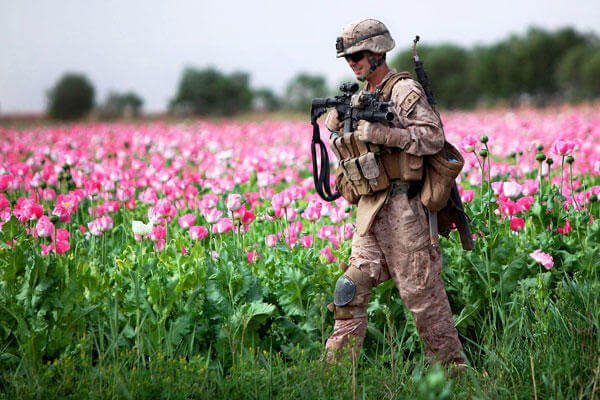Recent reports suggest that the Taliban has won the war on drugs in Afghanistan, the source of 75 percent of the world's heroin.
Despite the $7 billion U.S. anti-drug effort, Afghanistan has produced a record poppy crop this year and was in danger of becoming a "full-fledged narco state" with most of the profits going to fund the Taliban, the U.N. Office of Drugs and Crime said in a report last week.
In a separate report, the Defense Department said that "the narcotics market in Afghanistan is large, and insurgent penetration of that market is extensive and expanding." The DoD report earlier this month concluded that Taliban control of the drug trade was likely to expand even more as coalition forces withdraw.
"The narcotics issue in Afghanistan acts as a virus festering on a low immunity system of governance," said Jean-Luc Lemahieu, chief representative of the UNODC in Afghanistan. "The region and international community share responsibility in this."
"As long as we think that we can have short-term, fast solutions, we are continuing to be doomed to fail," Lemahieu said.
The non-partisan Congressional Research Service has estimated Taliban profits from the drug trade at $70 million to $100 million annually, while Afghan counter-narcotics officials put the insurgents' windfall as high as $400 million.
The UNODC report said the cultivation in Afghanistan of poppy, which is processed into heroin, rose 36 percent this year, amounting to about 209,000 hectares. Farmers have little incentive to substitute other crops for poppy. They can get as much as $145 for one kilogram of dry opium, compared to 41 cents for one kilogram of wheat, the UNODC said.
In addition, opium production amounted to 5,500 tons in 2013, nearly doubling the amount produced in 2012, according to the 2013 Opium Survey released jointly by the UNODC and the Afghan Ministry of Counter-Narcotics.
Southwestern Helmand province, where U.S. Marines and British forces are concentrated, historically has been the lead poppy producer, and in 2013 poppy cultivation in Helmand has increased by 34 percent, the Opium Survey said.
The farming of poppy has also expanded to the north and west in Balkh and Faryab provinces, which traditionally had been poppy free, the survey stated.
"The situation is worsening, that is clear and very disappointing," said Yuri Fedotov, executive director of the UNODC.
The U.S. has indicated that the war on drugs is no longer a priority as the coalition prepares to withdraw all combat forces by the end of 2014.
"Military operations, with fewer participating forces, are focusing on traditional military targets," said the Defense Department report on Progress and Stability in Afghanistan, issued every six months by the DoD.
"Drugs-nexus targets have a lower priority," the report said. "The net result has been a drop in the amount of drugs interdicted inside Afghanistan."
The report also noted that drug trafficking contributed to the widespread corruption in the Afghan government.
The report offered little hope of transforming an Afghan mindset that appeared to recognize corruption as the norm in government affairs.
"The 'realpolitik' of accepting corruption as part of building and maintaining fragile alliances in an ethnically-fractured political landscape has left Afghanistan with a political elite that is widely regarded as the greatest contributor to the corruption problem," the report said.




























